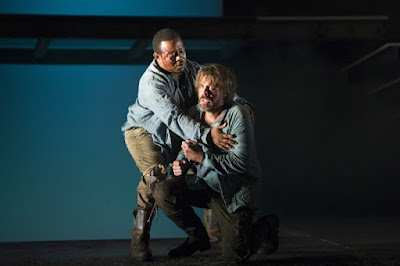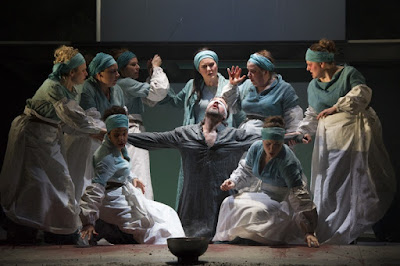 |
| Iphigénie (Catherine Carby), Oreste (Grant Doyle) Iphigénie en Tauride, English Touring Opera. Photo: Richard Hubert Smith |
Reviewed by Robert Hugill on Mar 5 2016
Star rating:
Remembered pain and classical style, Gluck's rarely performed masterpiece in Hackney
 |
| John-Colyn Gyeantey, Grant Doyle - Gluck: Iphigenie en Tauride photo Richard Hubert Smith |
Gluck's opera was premiered in 1779 and was his fifth opera for Paris. The work came at the end of a long career (his first opera dates from 1741) in which he had shown himself as a composer able to accommodate different national styles, and to innovate by syntheses. His Italian reform operas for Vienna merged elements of French and Italian opera, and this continued with his operas for Paris. Iphigenie en Tauride is a logical extension of this reform, effectively re-shaping the tragedie lyrique of Lully and Rameau into something more concentrated, more classical and more powerfully intense.
There is little in the way of ballet in the opera, and certainly none of the divertissements beloved of Lully and Rameau, there is no explicit love interest and the main relationships are the re-establishing of the fraternal bond between Iphigenie (Catherine Carby) and Oreste (Grant Doyle), and the intense friendship between Oreste and Pylade (John-Colyn Gyeantey). This latter while couched exclusively in the language of friendship ('amitie' rather than 'amour'), is in face one of the most homo-erotic relationship in a major 18th or 19th century opera.
 |
| Catherine Carby, Grant Doyle & female chorus photo Richard Hubert Smith |
At the Hackney Empire, the mood was set immediately, before a note of music, with Anna Fleischle's elegant abstract set. A single wall bisected vertically by a huge, opaque window (which was lit in a variety of colours) and a horizontal walkway, thus creating a balanced sense of intersecting shapes, but (along with a platform to the right) providing a series of useful playing areas.
The work opens in media res with a storm scene which crashes onto Iphigenie's first aria. Martin Andre and the 35-strong orchestra impressed with the sense of style and contained passion that they brought to the music. Some stylish HIP elements merging with playing of real strength. James Conway used the storm to give us a shock. The priestesses wore white aprons over their blue robes and were wrestling with an animal to sacrifice it to Diana, all covered in blood and the culmination of the ritual was the draining of the blood from the body. This put into context Iphigenie's opening lament for their fate.
When it comes to the performers it is worth bearing in mind that English Touring Opera puts its seasons together as a repertory, so that many singers do double (or triple duty). Catherine Carby, Grant Doyle and John-Colyn Gyeantey all sing major roles in both Gluck's Iphigenie en Tauride and Donizetti's Pia de'Tolomei, operas which require very different styles of musical performance.
 |
| Grant Doyle, Colyn-John Gyeantey & male chorus photo Richard Hubert Smith |
Grant Doyle was an intense, severe Oreste but then he has every right to be as the character was indeed very haunted. The role lies quite high (the pitch at which the operas were first performed was probably significantly lower than modern standard), and Doyle sang with admirably firmness, strength of line and sustained tone. There were times when I wished that he was a bit more relaxed, but you can argue that Oreste is an intense, hag-ridden character. However there were moments when Doyle could perhaps ease off a little. Overall this was an impressive account of a tricky role.
 |
| Grant Doyle, Pepper Cometti - photo Richard Hubert Smith |
After the performance one of my companions commented on what a beautiful voice John-Colyn Gyeantey has. His main area of specialism seems to be bel canto Italian opera and he brought the same vibrant intensity of line to the role of Pylade. Coupled with a very strong dramatic feel, this was a strongly dramatic and engrossing performance. But I wanted the sense of fluid ease which an haute-contre style voice would bring to the role, though in the context of the production this performance worked well.
Craig Smith is a singer whom I have admired greatly in previous English Touring Opera performances. His performance as Thoas however seemed to be a little wide of the mark. In an effort, I think, to make Thoas seem rough and uncouth, Smith's account of the role was effortful to say the least, though it has to be admitted that Thoas is probably not the most grateful part to sing.
The supporting cast were all strong, Simon Gfeller as a Scythian Guard, Ashley Mercer and Bradley Travis as Ministers of the Sanctuary who, with a further eight men made up the male chorus, all threateningly uncouth and lively in their enjoyment of violence. Their moment of ballet was a grim piece of torture of Oreste and Pylade. Susanna Fairbarn and Samantha Hay were Priestesses of Diana, with six further Greek Priestesses, making a poised and elegantly expressive female chorus echoing Iphigenie's grief. Bernadette Iglich's choreography was discreet but gave the women some finely expressive movement.
The opera was sung in French, and for much of the time this was idiomatically creditable; Grant Doyle in particular seemed to have the knack of the right vocal placement to give just the right sort of French sound. But with a number of the soloists, the sense of the correct French sound did rather tend to come and go and the more stressful the music the less clearly the language.
The role of the goddess Diana, who appears at the end as a dea ex machina, was performed by a young child, Pepper Cometti. The image of the young girl as the goddess's incarnation worked well, but though Cometti sang creditably it made you understand how tricky Gluck's vocal lines can be.
That the performance got so much right in terms of style was partly down to conductor Martin Andre, who kept singers and orchestra on track, encouraging them to combine a sense of drama with a right sort of classical style.
Overall this was a highly creditable performance, which drew you into the drama. James Conway and Martin Andre and their performers created a recognisable sense of the remembered pain and classical elegance which is essential to the work. I suspect that, first night over, this is a performance which will bed in nicely. Performances run until 1 June 2016, full details of the tour dates and locations from the English Touring Opera website.
Recommended listening:
Gluck: Iphigenie en Tauride - John Eliot Gardiner, Thomas Allen, Diana Montague, John Aler, Monteverdi Choir, Orchestre de l'Opera de Lyon
Gluck: Iphigenie en Tauride - Martin Perlman, Christine Goerke, Rodney Gilfrey, Vinson Cole, Boston Baroque
Elsewhere on this blog:
- Not a shooting star, but a well rooted planet: My interview with Ilona Domnich
- Highly personal Alice Coote, Christian Blackshaw in Schumann's Dichterliebe and Frauenliebe und -leben on Wigmore Hall Live - CD review
- Entrancing: Duets by Schumann, Mendelssohn, Peter Cornelius from Lucy Crowe & William Berger - CD review
- Musical values: Handel's Orlando with Iestyn Davies - opera review
- Saxon reserve and Italian passion: The Brook Street Band - concert review
- Strong revival: Puccini's Il trittico at Covent Garden - opera review
- Dramatic involvement: Verdi's Il trovatore from Chelsea Opera Group - opera review
- Youthful exuberance: The Sixteen in Handel's Dixit Dominus - concert review
- Distinctive voice: Michael Csanyi-Wills' songs with orchestra - CD review
- Somewhere over the rainbow: Song in the City celebrates LGBT History Month - concert review
- Heroique flashes: Bryan Hymel & Irene Roberts at Rosenblatt Recitals - concert review
- Home


%20in%20The%20Merry%20Widow.%20Credit%20Mihaela%20Bodlovic.%20(2).jpg)

%20in%20Trial%20by%20Jury.%20Credit%20Mihaela%20Bodlovic..jpg)

.jpg)
%20Britten%20Pears%20Arts%20(1).jpg)



No comments:
Post a Comment